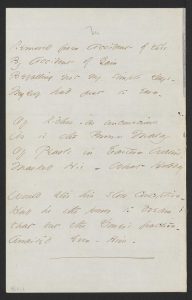Removed from Accident of Loss
By Accident of Gain
Befalling not my simple Days –
Myself had just to earn –
Of Riches – as unconscious
As is the Brown Malay
Of Pearls in Eastern Waters –
Marked His – What Holiday
Would stir his slow conception –
Had he the power to dream
That but the Dower’s fraction –
Awaited even – Him –
Link to EDA manuscript. Originally in Packet X, Mixed Fascicles, ca. 1858-1862. Fascicle 14. First published in Unpublished Poems (1935), 73. Courtesy of Houghton Library, Harvard University, Cambridge, Mass.
One of the governing structures of the relation with Sue and with her literary avatar is triangulation, based on several biographical triangles: Dickinson-Sue-Austin, Dickinson-Sue-Samuel Bowles, and perhaps Dickinson-Kate Anthon-Sue. Anthon was a young widow and school friend of Sue’s whom Emily met in 1860 at Sue’s house and about whom she developed warm and even passionate feelings.
We have seen this triangulation before in “The Malay – took the Pearl” (F451A, J425), discussed in an earlier post on White. Farr places that poem and “Removed from Accident of Loss” in what she calls “the pearl sequence” and links it to Dickinson’s network of imagery of
riches/poverty, intelligence/dullness, and the eastern sea – her complex conceit embracing passion, imagination, and eternal life.
Although Farr paraphrases the poem as a scenario much like “The Malay took the Pearl,” with Austin as the masculine “dark” force “unconscious” of his wealth and acting as the rival of the “simple” speaker for the affections of Sue/the pearl, the poem seems determined not to give up a meaning readily. Is the speaker relieved to be “removed” from the loss? Or does the emphasis fall on the repeated word, “accident,” which suggests the beloved object’s unpredictability? Some economy of loss and gain, accident and earnings, riches and holiday from work, dreams and dowers mark the speaker’s response to what she cannot have.
Sources:
Farr, Judith. The Passion of Emily Dickinson. Harvard University Press, 2004, 150-51.


